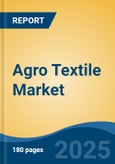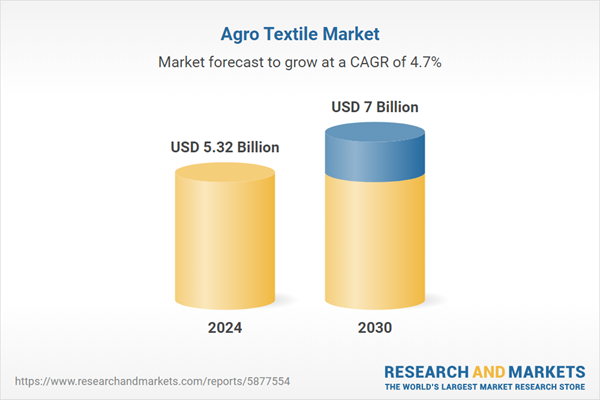Speak directly to the analyst to clarify any post sales queries you may have.
10% Free customizationThis report comes with 10% free customization, enabling you to add data that meets your specific business needs.
With agriculture facing mounting pressures from climate volatility, land constraints, and escalating food demand, agro textiles have become indispensable in enabling precision cultivation and high-value crop protection. Their ability to deliver measurable productivity gains while supporting sustainable, resource-efficient farming practices positions the market for sustained growth, driven by innovation, specialized product development, and integration into modern agricultural systems worldwide.
Key Market Drivers
Rising Global Food Demand and Agricultural Intensification
Rising global food demand and agricultural intensification are among the most powerful forces driving the growth of the global agro textile market. The global population, currently estimated at 7.6 billion, is projected to rise to 8.6 billion by 2030, reaching 9.8 billion by 2050 and 11.2 billion by the end of the century food production systems are under unprecedented pressure to deliver higher yields, better quality produce, and year-round availability. This demand is further amplified by changing dietary preferences, including greater consumption of fresh fruits, vegetables, and protein-rich crops, which require careful cultivation and protection.Agricultural intensification the practice of producing more output from the same or even smaller areas of land is becoming essential to meet these needs without further depleting natural resources. Agro textiles play a central role in enabling this intensification by creating favorable microclimates for crops, protecting them from pests, weeds, and harsh weather, and optimizing light, temperature, and moisture levels. Products such as shade nets, mulch mats, insect barriers, and ground covers directly contribute to higher productivity by reducing crop loss, improving plant health, and enhancing growth rates.
The growing focus on high-value horticulture and specialty crops has accelerated the adoption of agro textiles in controlled-environment farming systems such as greenhouses, polyhouses, and shade structures. These systems allow farmers to maximize output per square meter while meeting the increasing quality standards demanded by domestic and export markets. By enabling efficient land use, reducing dependence on chemical inputs, and supporting multiple crop cycles per year, agro textiles align with the global push for sustainable yet high-output agriculture. This synergy between rising food demand and agricultural intensification ensures that agro textiles remain a critical, fast-growing segment of modern farming practices worldwide.
Key Market Challenges
High Initial Investment and Installation Costs
Although agro textiles offer long-term cost savings through higher yields and reduced crop losses, their upfront costs for purchase, installation, and supporting infrastructure can be prohibitive particularly for small and marginal farmers. Setting up greenhouses, shade houses, or large-scale netting systems requires not only the textile material but also structural supports, labor, and maintenance, all of which increase the initial financial burden. In regions with limited access to agricultural credit or subsidies, farmers may delay or avoid adopting agro textile solutions, slowing market penetration.Key Market Trends
Shift Toward Smart and Functional Agro Textiles
The industry is moving beyond traditional crop protection solutions toward “smart” agro textiles that integrate advanced functionalities. These innovations include fabrics embedded with UV-blocking agents, temperature-regulating coatings, and even sensor-enabled textiles capable of monitoring humidity, light intensity, and pest activity. Such high-performance products allow farmers to fine-tune crop environments in real time, enhancing productivity while reducing manual intervention. As precision agriculture evolves, the demand for agro textiles with built-in monitoring and adaptive features is expected to accelerate.Key Market Players
- TenCate Industrial Fabrics
- Garware Technical Fibres Ltd.
- Beaulieu Technical Textiles SA
- Belton Industries, Inc.
- Meyabond Industry & Trading (Beijing) Co., Ltd.
- Diatex SAS
- Mogul Co., Ltd.
- Karatzis SA
- Hy-Tex (UK) Ltd
- Aduno s.r.l
Report Scope:
In this report, the Global Agro Textile Market has been segmented into the following categories, in addition to the industry trends which have also been detailed below:Agro Textile Market, By Material:
- Synthetic Fibers
- Natural Fibers
Agro Textile Market, By Type:
- Woven
- Non-Woven
- Knitted
- Others
Agro Textile Market, By End Use:
- Shade Nets
- Mulch Mats
- Anti-hail and Bird Protection Nets
- Anti-insect Nets
- Fishing Nets
- Packing Materials
- Root Ball Net
- Others
Agro Textile Market, By Region:
- North America
- United States
- Canada
- Mexico
- Europe
- France
- United Kingdom
- Italy
- Germany
- Spain
- Asia-Pacific
- China
- India
- Japan
- Australia
- South Korea
- South America
- Brazil
- Argentina
- Colombia
- Middle East & Africa
- South Africa
- Saudi Arabia
- UAE
Competitive Landscape
Company Profiles: Detailed analysis of the major companies present in the Global Agro Textile Market.Available Customizations:
With the given market data, the publisher offers customizations according to a company's specific needs. The following customization options are available for the report.Company Information
- Detailed analysis and profiling of additional market players (up to five).
This product will be delivered within 1-3 business days.
Table of Contents
Companies Mentioned
The leading companies profiled in this Agro Textile market report include:- TenCate Industrial Fabrics
- Garware Technical Fibres Ltd.
- Beaulieu Technical Textiles SA
- Belton Industries, Inc.
- Meyabond Industry & Trading (Beijing) Co., Ltd.
- Diatex SAS
- Mogul Co., Ltd.
- Karatzis SA
- Hy-Tex (UK) Ltd
- Aduno s.r.l
Table Information
| Report Attribute | Details |
|---|---|
| No. of Pages | 180 |
| Published | September 2025 |
| Forecast Period | 2024 - 2030 |
| Estimated Market Value ( USD | $ 5.32 Billion |
| Forecasted Market Value ( USD | $ 7 Billion |
| Compound Annual Growth Rate | 4.6% |
| Regions Covered | Global |
| No. of Companies Mentioned | 11 |









